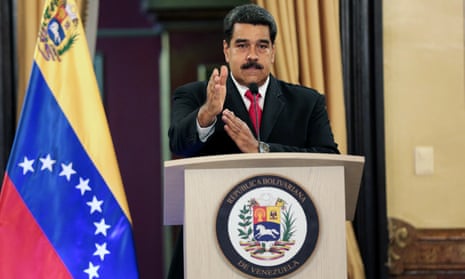Venezuela’s president, Nicolás Maduro, has survived an apparent and – if true – audacious assassination attempt when, according to official reports, drones loaded with explosives flew towards the president while he was speaking at a military parade in Caracas.
But many are now wondering: who could have been behind the attack?
Foreign powers
According to Maduro, the plot was concocted by an international cabal of rightwing schemers. He claimed the Colombian president, Juan Manuel Santos, was “behind the attack”, supported by a network of plotters and financiers based in Florida, adding that a group of hired assassins had already been captured.
Maduro, whose country is in economic and political turmoil, with inflation predicted to reach 1m% this year, has long accused the international community of waging economic war on him. He regularly lambasts the US as “imperialist” and says it is out to destroy socialism while taking over Venezuela’s oil – of which it has the largest reserves in the world.
The opposition within Venezuela is also a regular target. Maduro claims it wants to undo the social reforms brought about by previous president Hugo Chávez, the charismatic revolutionary who died in 2013. Maduro has jailed and sidelined many opposition activists, regularly accusing them of plotting to overthrow him.
It is this conspiracy that Maduro claims will be unearthed in an ongoing investigation.
Rightwing rebels
No one has claimed responsibility for the alleged assassination attempt outright, though one group – Soldiers Franelas – suggested involvement in a tweet. “We have shown [the government] is vulnerable,” the group said. “[The attack] wasn’t achieved today but it is just a matter of time [until it is].” Little is known about Soldiers Franelas beyond their Twitter presence, where the group regularly posts anti-Maduro tweets.
La operación era sobrevolar 2 drones cargados con C4 el objetivo el palco presidencial, francotiradores de la guardia de honor derribaron los drones antes de llegar al objetivo.
— Soldados de Franelas (@soldadoDfranela) August 4, 2018
Demostramos que son vulnerables, no se logró hoy pero es cuestión de tiempo. #MilitaresPatriotas pic.twitter.com/teIEwygN3S
The episode on Saturday reminded many in Venezuela of a similar incident last year when Óscar Pérez, a rogue police officer, launched grenades from a stolen helicopter at government buildings in Caracas. Pérez was killed in a shootout six months later. Some analysts suspect Soldiers Franelas of involvement in that incident.
A hoax
Some observers are suspicious of Maduro’s account of events, saying it seems a little too neat in a country where the government has long twisted the truth to its own ends.
“The official ‘investigation’ of today’s alleged assassination attempt against president Maduro takes the usual course: begin with the conclusions and work backwards,” Phil Gunson, a consultant with non-profit Crisis Group, tweeted on Saturday evening. “In a country where 98% of crime goes unpunished, government sleuths resolve this kind of case in a matter of hours.”
Firefighters interviewed by the Associated Press claimed that the bangs heard were caused by a gas tank explosion in a nearby apartment. Some local journalists have backed up the claim, posting photos on Twitter of smoke billowing from the Residancias Don Eduardo apartment building on the street where the attack took place.
David Smilde, a senior fellow at the Washington Office on Latin America, voiced doubts that the incident was a staged attack. In an interview with AP, he claimed footage of the chaotic scenes at the parade – which for a short while were broadcast to the nation before being abruptly cut off – made Maduro look weak. But Smilde said the embattled president will still probably use the attack to cement his power.
“He will use it to concentrate power, whoever did this,” Smilde said. “He’ll use it to further restrict liberty and purge the government and armed forces.”
